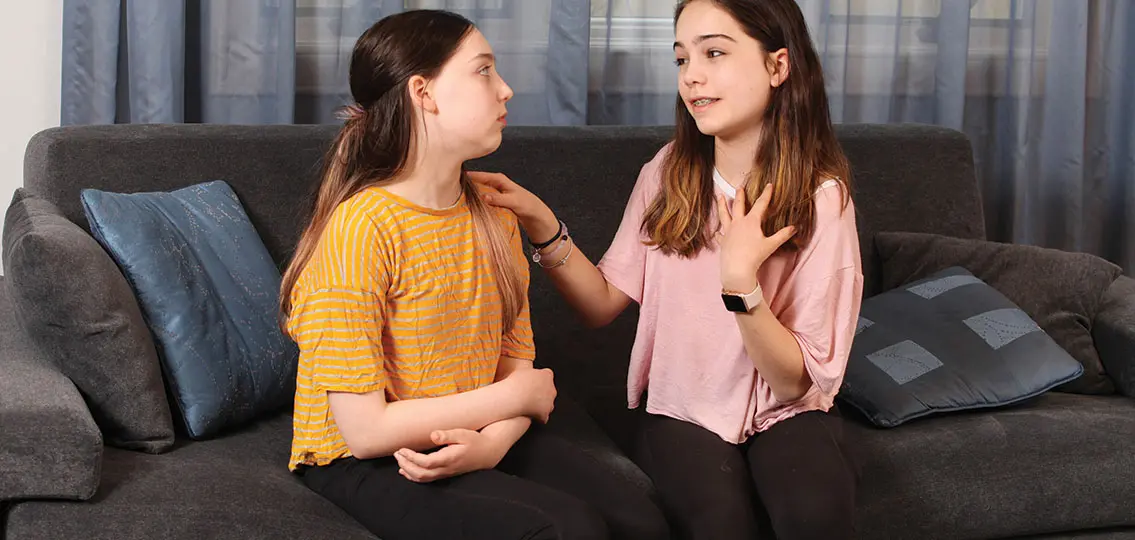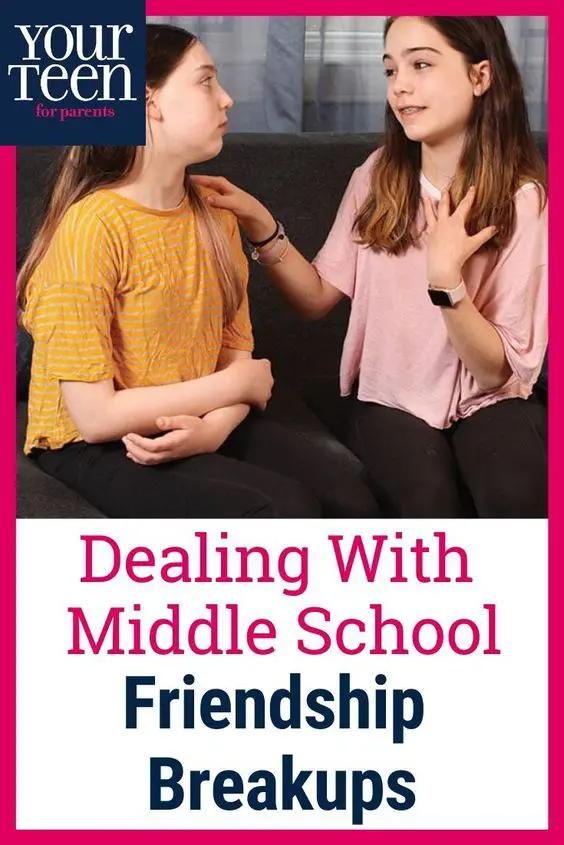“How is Maggie?” I asked my seventh grader one day on the way to soccer practice.
“I don’t know,” she replied matter-of-factly.
“You don’t know? How could you not know? Don’t you see her every day?” I was a little shocked by my daughter’s response — this was one of her best friends and her lunch table buddy for the past three years.
“I don’t know, Mom. She doesn’t sit at our table anymore. She sits with some other girls. It’s fine,” she said with a tone that told me it was not fine, but also that she didn’t want to talk about it, either.
How to Handle a Friendship Breakup:
I found out later that Maggie started hanging out with some other girls who were in the same extracurricular activity at school, and she subtly started moving her way to a new group. There was no animosity between the girls, but I could see the hurt on my daughter’s face — and of course, I felt helpless.
“When our child goes through a friendship breakup, it can bring us back to middle school all over again,” says Sheryl Gould, certified parent coach and founder of the website Moms of Tweens and Teens. “It triggers those painful feelings we experienced and makes our blood boil, which in turn can lead us to overreact and make things worse.”
How to Respond When Your Child Gets Left Out:
1. Listen and validate
What should parents do? Take a deep breath and listen no matter how silly or upsetting it seems to you.
Gould recommends validating your child’s experience. Saying something as simple as “I’m so sorry. That must really hurt,” can be enough to soothe your child and get them to keep talking.
2. Focus on resilience
At this age, friendships often dissolve naturally, but sometimes they end in an uglier, more abrupt way.
“While it may be tempting to shelter your child from the hurt or try to help them move on quickly, you don’t want to rob your child of the resilience that comes with facing difficulty,” says Michele Kambolis, a therapist and author of Generation Stressed. “It’s through struggle that our children grow into their resiliency.”
According to Gould, the end goal is to get your tween to see themselves as more of a problem-solver than a victim, so ask questions like “Are there any kids you could invite to sit at your lunch table that might need a friend?” or “What will you do differently if this happens again?”
3. Discourage social media
Kambolis suggests discouraging your child to take to social media to air any grievances. Instead, encourage them to talk to peers face-to-face. If they are shunned from a group, “Help your tween find ways to remain engaged and focused on passion projects that leave them feeling valued,” she says. “It can be tempting for adolescents to rely on technology as a way to cope, but that’s often not helpful.”
4. Get help if necessary
While parents should always keep the lines of communication open, they should also try not to intervene. That said, if your child is suddenly isolated at school, talk to a guidance counselor or trusted administrator about the situation to ensure it does not escalate to bullying or mental health concerns. “If your child stops eating, starts sleeping or eating too much, or is withdrawing from social activities for more than two weeks, talk to a medical professional,” says Kambolis.
How to Help Your Child End a Friendship:
1. Encourage them to have a conversation
What if it’s your child ending the friendship? “If your child is the one pushing a friend away, help them discover ways to pull back from the friendship compassionately,” says Kambolis.
Tweens can feel a lack of closure when a relationship ends, and they may be left obsessing about what they might have done wrong, Kambolis says. “Encourage your tween to tell their friend why they are ending the relationship, and to think about what it would feel like for them if they were in the same situation.” As with any breakup, the fundamental rule is to focus your comments on your own feelings. Give your kid some sample language, such as, “This might be hard to hear, but I feel like our friendship has become one-sided.”
2. Coach them to be kind
For some tweens, the thought of having a conversation like this may be overwhelming. Even if they’re not able to work themselves up to this level of frankness, encourage kindness. Ghosting — the practice of ending a personal relationship with someone by suddenly and without explanation withdrawing from all communication — is never appropriate. Explain to your child that just because you’re no longer friends with someone does not mean you can’t be cordial. And ensure your child understands what that looks like. It could be a smile in the hall or a wave out the car window while distancing themselves from a lunch table or no longer hanging out on weekends.
Also, don’t be afraid to provide perspective from your own life regarding your friendships, including how they sometimes have seasons and bumps in the road. “Remind kids that a bad conversation or text exchange with a friend doesn’t mean the friendship is over,” says Gould. Middle schoolers are learning firsthand that friendship is complicated — and that, with our help, they can enjoy the ups and weather the downs.





